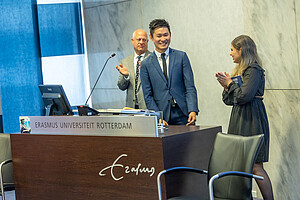PhD Defence Hodar Lam

In his dissertation, Lonely-ship: The Emergence and Experience of Leader Loneliness, ERIM’s Hodar Lam adopted multiple perspectives and research methods to investigate the oftentimes overlooked phenomenon of loneliness, especially in leadership contexts. Despite the significant growth in interest across scholars from disciplines such as psychology, sociology, and philosophy, only recently has the phenomenon of loneliness gained traction in the management field. However, grey areas persist as scholars tend to combine leader loneliness with general loneliness, which is prone to overlooking the leadership-specific factors that may trigger loneliness experiences. Hodar's work is a timely response to the loneliness “epidemic” and calls for more attention to leader emotional challenges in both research and practice.
Hodar defended his dissertation in the Senate Hall at Erasmus University Rotterdam (EUR) on Thursday, 5 October 2023. His supervisors were Prof. Dr. Steffen Giessner (RSM), Prof. Meir Shemla (EBS Business School), and Dr. Mirjam Werner (RSM). Other members of the Doctoral Committee were Prof. Sut I Wong (BI Norwegian Business School), Prof. Dr. Joep Cornelissen (RSM), Prof. Dirk van Dierendonck (RSM), Dr. Bex Hewett (RSM), and Dr. Annebel de Hoogh (University of Amsterdam).
About Hodar Lam

Hodar Lam was born in Hong Kong in 1990. He received his Bachelor’s degree in Social Sciences (major in Psychology; minor in Social Work and Social Administration) from the University of Hong Kong, during which he was on an academic exchange at the National University of Singapore. He then obtained his Master of Philosophy degree in Industrial-Organizational Psychology at the Chinese University of Hong Kong, and his Master of Philosophy degree in Organisation Research at Rotterdam School of Management, Erasmus University (RSM). In 2016, he started his doctoral trajectory in Organisational Behaviour at RSM. He was a visiting researcher at the University of Queensland Business School, Australia from September to December 2018.
With an industry background in human resources management and counselling, Hodar’s research focuses on emotions and well-being issues (especially loneliness and solitude) at work. His research has appeared in Applied Psychology: Health & Well-being and has been invited for revised submissions in leading management journals. He has presented his work at major international conferences, including the Annual Meeting of the Academy of Management (AoM), European Group of Organization Studies Colloquium (EGOS), and European Association of Work and Organizational Psychology (EAWOP) Conference. In 2022, he organised the AoM symposium “Disconnected at work: Conversations to connect theories and empirics”. Moreover, he has contributed knowledge to industry-oriented outlets, such as Forbes, QS Top Universities, and I/O at Work, and delivered webinars and podcasts on loneliness, leadership, well-being at work, and mental health.
Passionate about tertiary education in management and psychology, Hodar has taught courses in the areas of leadership, coaching, diversity, personnel management, social psychology, developmental psychology, and research methods. He has supervised more than 70 master's and bachelor's thesis and internship students. He was awarded the University Teaching Qualification (Dutch: Basiskwailificatie Onderwijs; BKO) in 2021.
Hodar joined University of Amsterdam as an Assistant Professor of Work and Organisational Psychology in February 2021. Starting from August 2023, he will continue his career at Lingnan University, Hong Kong as a Research Assistant Professor of Work and Organisational Psychology.
Thesis Abstract

Over the past few decades, interest in loneliness – broadly defined as the subjective, unpleasant experience of social disconnectedness – has grown significantly. Scholars from disciplines such as psychology, sociology, and philosophy have been studying the phenomenon and its largely undesirable consequences to individual health, general functioning, and relational outcomes. Despite rising academic interest in these adjacent academic domains, loneliness has only recently started to attract attention in the management field. This is surprising, given the potential negative organisational and managerial implications of loneliness.
Leaders, particularly, seem to be vulnerable to experiences of loneliness. Yet, scholars tend to conflate leader loneliness with general loneliness. Considering leadership often involves directing teams, influencing strategic directions, and making high-pressure decisions in organisations, a generalised approach ignores these leadership-specific factors that may trigger loneliness experiences.
To better understand this overlooked phenomenon, multiple perspectives and methods were adopted in this PhD thesis, including (a) a review-based critique of the dispersed literature of leader loneliness; (b) a qualitative interview study on the leadership narratives of loneliness; and (c) a quantitative project on the loneliness of mid-level managers, using an experiment and a three-wave panel survey study. Together, Hodar's work is a timely response to the loneliness “epidemic” and calls for more attention to leader well-being issues in both research and practice.
View photos of Hodar's PhD Defence
Photos: Chris Gorzeman / Capital Images


